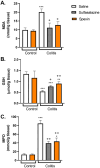Anti-Inflammatory Effects of Spexin on Acetic Acid‑Induced Colitis in Rats via Modulating the NF-κB/NLRP3 Inflammasome Pathway
- PMID: 40320895
- PMCID: PMC12050913
- DOI: 10.1002/jbt.70285
Anti-Inflammatory Effects of Spexin on Acetic Acid‑Induced Colitis in Rats via Modulating the NF-κB/NLRP3 Inflammasome Pathway
Abstract
Ulcerative colitis is a chronic inflammatory bowel disease characterized by inflammation and ulcers in the lining of the colon and rectum. Spexin is a novel peptide with antioxidant and anti-inflammatory properties. This study aims to elucidate the therapeutic effects and underlying mechanisms of spexin in mitigating acetic acid-induced colitis in rats. Male Sprague Dawley rats were assigned to control (n = 14) and colitis (n = 21) groups. Colitis was induced via 5% acetic acid (AA) administration (1 mL, intrarect). Post-induction, rats received subcutaneous saline (1 mL/kg), spexin (50 µg/kg/day), or oral sulfasalazine (500 mg/kg) for 5 days. Control groups received saline or spexin. After 24 h of the final treatment, colons were evaluated macroscopically, and levels of tumor necrosis factor (TNF)-α, interleukin (IL)-1β, IL-18 were determined by ELISA, oxidative stress markers myeloperoxidase (MPO), malondialdehyde (MDA) and glutathione (GSH) levels were measured spectrophotometrically and NOD-like receptor pyrin domain-containing 3 (NLRP3), nuclear factor-κB (NF-κB), caspase-1 proteins were analyzed with Western Blot alongside histopathological assessments. Colitis induction significantly elevated macroscopic damage scores, stool consistency, inflammatory cytokines, MDA, MPO, and NLRP3, NF-κB, caspase-1, while reducing GSH levels (p < 0.001-0.01). Microscopic evaluations confirmed increased necrosis, submucosal edema, and inflammatory cell infiltration (p < 0.001). Spexin reversed these effects by enhancing GSH levels (p < 0.01), reducing macroscopic/microscopic scores, cytokines, MDA, and MPO levels (p < 0.05-0.001), and suppressing NLRP3, NF-κB, and caspase-1 activation (p < 0.01-0.001). For the first time that spexin ameluates acetic acid-induced colitis in rats by modulating the NF-κB/NLRP3 signaling pathway, reducing oxidative damage, enhancing antioxidant capacity, and suppressing inflammation.
Keywords: NLRP3; inflammation; oxidative damage; spexin; ulcerative colitis.
© 2025 The Author(s). Journal of Biochemical and Molecular Toxicology published by Wiley Periodicals LLC.
Conflict of interest statement
The authors declare no conflicts of interest.
Figures





References
-
- Arya H., Dass R., Chopra B., et al., “An Update on Herbal Products for the Management of Inflammatory Bowel Disease,” Anti‐Inflammatory & Anti‐Allergy Agents in Medicinal Chemistry 22, no. 1 (2023): 1–9. - PubMed
-
- Dai N., Yang X., Pan P., et al., “Bacillus Paralicheniformis, an Acetate‐Producing Probiotic, Alleviates Ulcerative Colitis via Protecting the Intestinal Barrier and Regulating the NLRP3 Inflammasome,” Microbiological Research 287 (2024): 127856. - PubMed
-
- Perera A. P., Sajnani K., Dickinson J., Eri R., and Körner H., “NLRP3 Inflammasome in Colitis and Colitis‐Associated Colorectal Cancer,” Mammalian Genome 29 (2018): 817–830. - PubMed
MeSH terms
Substances
LinkOut - more resources
Full Text Sources
Research Materials
Miscellaneous

